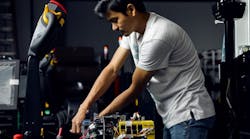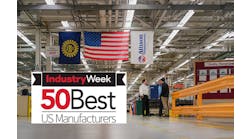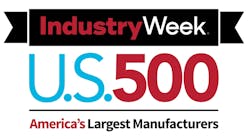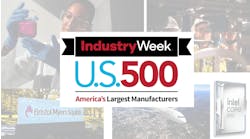Mfg. Day 2020: Vecna Robotics CEO Says Timing is Right to Attract Next Generation's Talents
Robots hold a special place in the hearts of the younger generation.
As early as middle school many children clamor to join the robotics club. By high school, they are in high gear and enamored with robotic competitions. And the number of kids who are competing to create the most innovative robots is large. The 2019-2020 FIRST robotics season will see around 312,00 students going toe-to-toe.
That’s a lot of talent that will most likely move into STEM careers. How can our industry entice those students to choose manufacturing as a career?
The first step is to let future workers know that automation, in all its forms including robots, is an integral part of both the daily tasks in a manufacturing operation as well as a system that will create interesting career paths.
To formulate those attractive career paths, manufacturers should view the optimization of human potential, just as it optimizes production processes.
“If we use the concept of orchestration and apply it to the best use of human capital, we can better match people’s talents and interests with the jobs that need to be done,” explains Vecna Robotics founder and CEO Daniel Theobald. Orchestration is a term that Theobald, who holds 67 patents and has 30 pending, created that is now an industry standard. Vecna, which manufactures robots for material handling, uses pivotal, its orchestration system, to coordinate and distribute real-time tasks taking into account a variety of factors, including the capability of both humans and robots.
Vecna has found that in many companies there is excess capacity both on the machine and human side. That, in turn, means that there is the opportunity to assign tasks that take into account the strengths and preferences of employees. “Over time we learn who is good at doing what. For example, the data can show us that one person is good at doing a particular job rather than another. The problem is that human beings don’t have all of the information that our system does and so they aren’t as good as figuring out job assignments,” says Theobald.Ironically, Theobald points out that many students' perception of manufacturing is that you do the same jobs every day, essentially becoming robots. When in fact the repetitive jobs should be left to robots and can free up people to choose jobs they enjoy and are good at.
“Employees need autonomy to feel fulfilled,” Theobald said. “Instead of just assigning work, using this system, you can set up a bidding system. For example, at the beginning of a shift, there are several tasks that need to be completed. Why not put these jobs up for bid? Employees can bid for the job they want to. This creates a new attitude. People become engaged and enthusiastic.”
A question might arise as to how manufacturers can find people that will find this bidding process energizing. Theobald has an answer. “When I hire, while I look at a person’s background and experience, what really matters is the person’s attitude and motivation. That’s what is essential, the rest of the job can be learned.”
And this enthusiasm is converted into a key business metric, retention. “Attracting and hiring is one thing, but retention is the more important business goal,” explains Theobald.
The foundation that is able to create this meaningful work is technology. Technology, says Theobald, is the best way to ensure a career path. And Theobald wants to ensure that not only his workforce but all students are exposed to the potential that technology offers. In 2014, he co-founded MassRobotics, a non-profit dedicated to the global advancement of the robotics industry. He is dedicated to the idea that technology can be used to improve life for everyone on the planet.
“People are looking for a sense of purpose and mission,” he says. “Businesses can’t just focus on business only. Companies need to think about how they are giving back to their community or the world so that the people who work for them can be part of that."
Theobald knows this from personal experience. “We have employees that could have gone somewhere else, but the sense of purpose they have here and the feeling that they are part of something meaningful and is what keeps them here.”
And he says what he is doing, others can achieve as well.
“Manufacturing is on a technology adoption cycle right now. It has been enabled by what has been happening the past 20 years as computers have evolved, mobile devices have thrived, and AI has given us ways to interpret data. We are going to see rapid changes over the next few years and that will provide an incredibly fruitful career path for young people. We are now going to ask our employees to be problem-solvers. And that’s the best use of the talent this younger generation has.”





